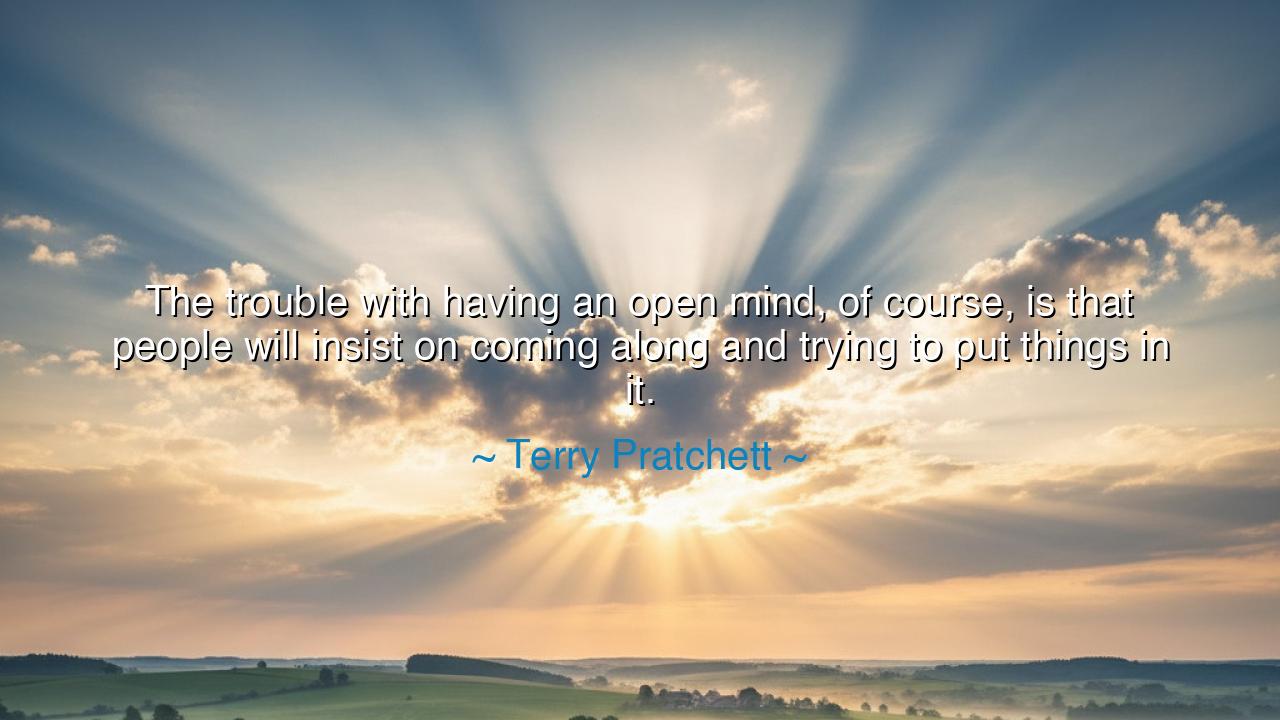
The trouble with having an open mind, of course, is that people
The trouble with having an open mind, of course, is that people will insist on coming along and trying to put things in it.






In the vast and complex landscape of human thought, one virtue has long been held in high esteem—the ability to keep an open mind. The very notion of an open mind carries with it the promise of growth, understanding, and the willingness to consider ideas that might challenge the status quo. Yet, as Terry Pratchett so astutely observes, “The trouble with having an open mind, of course, is that people will insist on coming along and trying to put things in it.” These words, spoken with both humor and truth, speak to the perils of openness, reminding us that while an open mind can lead to wisdom, it can also expose us to the weight of other people’s influence, ideas, and intentions.
Throughout the ages, philosophers and thinkers have recognized the power of the mind to shape our understanding of the world. The ancients taught that the mind is like a vessel, capable of being filled with wisdom, knowledge, and insight. But just as a vessel can be filled, it can also be overrun with foreign influences. Socrates, the great philosopher of Athens, believed that the pursuit of knowledge required an open mind—one that was free of prejudice and ready to embrace new ideas. Yet, even Socrates understood that the mind could be led astray by the wrong ideas, by the voices of those who sought to distort truth rather than reveal it. His teachings warned that while the mind must be open, it must also be discerning, capable of filtering out the falsehoods that would cloud its vision.
Consider the story of Galileo, whose work in astronomy shook the foundations of medieval thought. Galileo, with an open mind, dared to challenge the prevailing belief that the Earth was the center of the universe. He embraced the possibility that the sun, not the Earth, held this central place. Yet, as he ventured deeper into this new realm of thought, the voices of those with closed minds came rushing to silence him. The Church, which once embraced reason, sought to close his mind with dogma, demanding that he reject his findings. Galileo’s story is a powerful reminder that an open mind invites discovery, but it also invites resistance from those who fear the disruption of their established beliefs.
In a more modern context, Pratchett’s quote resonates with anyone who has ever sought to expand their understanding, only to be confronted by a world of competing ideas, all vying for attention. Whether through the constant barrage of media, political rhetoric, or the noise of society, we find that an open mind is often under siege. People, with their own agendas, seek to fill the space within us with their ideas, their opinions, their truths. The challenge, then, is not simply to open the mind but to cultivate the wisdom to choose which ideas to embrace and which to reject. Just as the ancient philosopher must have known, freedom of thought comes not from the sheer act of being open, but from the ability to discern the value of what is offered.
The lesson of Pratchett’s words is one of balance. Yes, we must keep our minds open, for it is through openness that we encounter the beauty of learning, the thrill of discovery, and the joy of seeing the world in new and expanded ways. But we must also be guardians of our thoughts, not allowing every voice to claim space within us. In the same way that the ancient warrior knew that the gates of his city must be open to trade and knowledge but also guarded from invaders, so too must we guard the gates of our minds, allowing in what will nurture us and rejecting what seeks only to control or mislead us.
Consider the example of Marie Curie, whose scientific work changed the course of history. Curie, driven by an open mind and an insatiable curiosity, faced a world that often sought to silence women in science. Yet, through her dedication, she allowed the world to pour into her mind the knowledge that would lead to groundbreaking discoveries. But even Curie had to protect her mind from the influence of those who doubted her, who sought to suppress her voice. She embraced the best ideas, pushing through the noise to create a legacy of wisdom that continues to illuminate the path of science.
The practical action we must take is one of mindful engagement. As we move through the world, let us strive to keep our minds open to the new, the unknown, and the unfamiliar, while also recognizing the power of discernment. Just as a farmer knows that not every seed will yield fruit, so too must we understand that not every idea is worthy of being cultivated. We must learn to listen with wisdom, to sift through the noise, and to allow only those ideas that will enrich us to take root. By doing so, we can protect the sanctity of our thoughts, guarding them against the forces that seek to fill them with doubt, fear, or falsehood. In the end, an open mind is not a mind that accepts all things, but a mind that engages, questions, and evolves with purpose and clarity.






AAdministratorAdministrator
Welcome, honored guests. Please leave a comment, we will respond soon